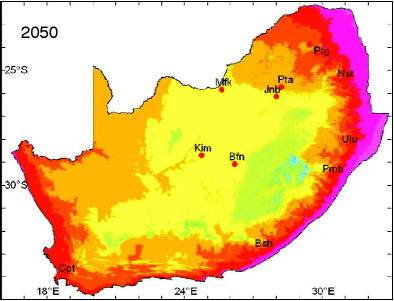|
CLIMATE CHANGE RESEARCH
Climate change research is both complex and uncertain. This is because climate itself is the result of complex interactions between the Earth's atmosphere, oceans and land surfaces that we do not fully understand. In order to simulate and predict climate, scientists have developed computer programs known as General Circulation Models or GCMs. If, for example, information about the concentration of greenhouse gases in the atmosphere is given, these models can roughly predict the climatic conditions that will result - The South African Country Study was based on climate predictions for the year 2050 produced by two internationally renowned institutes, the Hadley Centre (UK) and National Centre for Atmospheric Research (NCAR, USA). These predictions assume an increase in atmospheric carbon dioxide (CO2) from about 370 ppm in the year 2000 to 550 ppm in 2050.
PREDICTING THE CLIMATE
It is clear from the computer models that climate will not change uniformly across the globe. Land areas will warm up faster than the oceans and polar latitudes faster than temperate latitudes. Coastal temperatures will generally rise more slowly than inland, thanks to the moderating effect of the ocean. In the Northern Hemisphere global warming may actually benefit agriculture, as areas that are currently too cold to farm become warmer. On the other hand, agriculture faces an uncertain future in the Southern Hemisphere, where large areas will become as much as 3°C warmer and much drier. Higher temperatures are predicted over the whole of South Africa. January temperatures are expected to increase most in the central interior and Northern Cape (2.5-4.5°C), and least at the coast (0.5-1.0°C). In general, summer rainfall will decrease by between 5% in the northern regions and 25% in the Eastern and southern Cape. The Western Cape may lose as much as 25% of its current winter rainfall.
|

